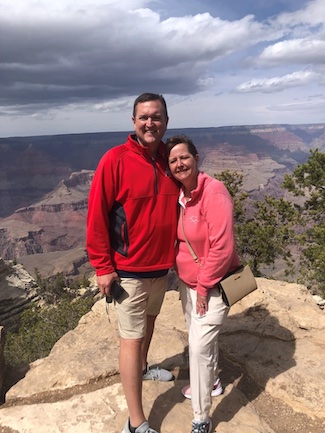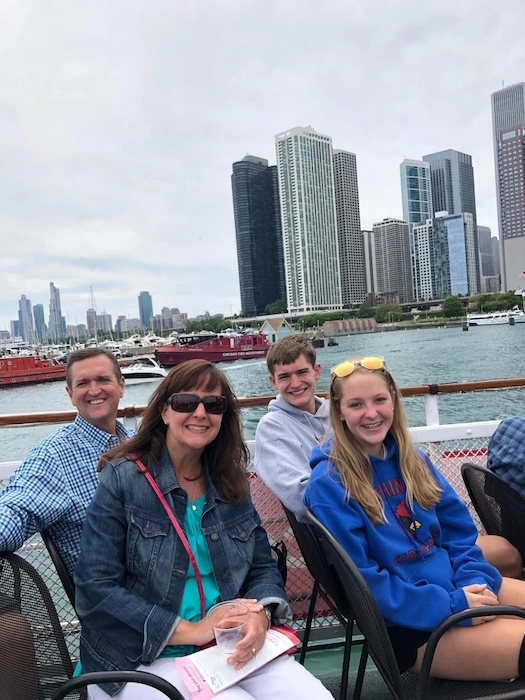
Gleen Moog and his wife.Courtesy Glenn Moog
Since being diagnosed and recovering from HPV tongue cancer, Glenn Moog wants others to know about how the HPV vaccine can protect others from cancer.
After having chronic sinus problems, Glenn Moog noticed a little bump on his neck. He thought his lymph nodes had become swollen. About five months after noticing it, he visited his doctor.
“She felt it and said, ‘Now, I don’t like the way this feels. You need to get a scan right away,’” Moog, 57, of Columbus, Ohio tells TODAY.com. “Within 24 hours, they told me I had stage 4 cancer.”
HPV, the human papilloma virus, caused the cancer on base of Moog’s tongue. A lump in the neck due to a swollen lymph node that slowly gets bigger is a common symptom of cancers in the mouth, according to Cancer Research U.K.
Doctors have been seeing an increase in head and neck cancers from HPV, and that’s why Moog is sharing his story.
“I’d never heard of HPV to be quite honest,” he says. “I was a little surprised.”
Sinus troubles and a growing lump
In the middle of 2017, Moog noticed the lump on his neck but thought it was simply his lymph node working to help him with his chronic sinus troubles.
“I just figured … it was a swollen lymph node, not a big deal, and then over time it kept getting bigger and bigger,” he says. “I kept thinking, ‘Oh well, it’s just a lymph node fighting off the infection.’”
After about five months, though, the lump remained. That’s when he visited the doctor and underwent a scan to learn more about it. Hearing he had stage 4 cancer felt overwhelming.
“I (felt) scared, helpless. I don’t really remember exactly. I felt unprepared,” he says. “I didn’t really know what to do next.”
He shuffled from doctor to doctor to understand the treatment plan. Early on, doctors knew that HPV caused Moog’s cancer, and that influenced his treatment plan, which included 35 rounds of radiation and five rounds of chemotherapy over seven weeks.
“I probably responded worse than most,” Moog says. “I thought I would be able to continue to eat and function, and I was literally put on the couch for six to eight months.”
Even though Moog’s cancer was found at stage 4, his doctors believed it was treatable.
“(My cancer doctors) were saying, ‘We caught this fairly early. It’s a slow-growing cancer. If you get this treatment, we have a high success rate,’” he recalls. “I was very optimistic. … I had to go through the pain to get to the end.”
After treatment, Moog was cancer free. But the side effects from head and neck radiation lingered, and he still struggled to eat and swallow.
“As I kept getting more radiation, I just kept burning my throat more and I kept eating less. And then finally they were like, ‘You’re losing too much weight too quickly,’” he says. “I had to get a stomach tube to eat because I couldn’t swallow any longer.”
HPV-related head and neck cancers
Doctors have been seeing an increase of head and neck cancers caused by HPV, which can also cause cervical cancer, Dr. Matthew Old, director of the department of otolaryngology, head and neck surgery, at the Ohio State University Comprehensive Cancer Center, tells TODAY.com. Most people are infected with HPV when they start sexual activity, and there’s a “significant lag time” from then until a head or neck cancer due to HPV develops, Old explains.
HPV infects the tonsils or the back of the tongue, and that’s where HPV-related cancers are found. The increase in cases is due to the cancer developing in people between 40 and 65, who were too old to be vaccinated against HPV, he adds.
“We’re going to continue to see an increase incidence in this cancer for about 20 years before we see the benefits of vaccination,” Old says.
People with HPV often never know they have it because they don’t have any symptoms, Old says. HPV-related head and neck cancers also do not have a lot of signs associated with them.
“The most common symptom people have is a neck mass or a lump on the side of the neck,” he says.
Other signs can include:
* A long-lasting sore in their mouth
* Trouble swallowing
* Changes in their voice
* Weight loss
“Symptoms that are persistent for more than two weeks, that’s when people really need to get checked out by their primary care doctor or an ear, nose and throat provider,” Old says.
HPV-related head and neck cancers are more treatable than cancers in these parts of the body not caused by HPV. But because HPV-cancer patients tend to live longer, they may end up dealing with the unpleasant side effects of treatment for longer, too.

Glenn Moog and his family.Courtesy Glenn Moog
Treatment may include surgery, radiation and chemotherapy. Doctors try to avoid radiation if possible because radiation causes lasting impacts, such as difficulty swallowing or loss of taste.
Old encourages people to vaccinate their children against HPV and get the shots themselves if they still qualify. The U.S. Centers for Disease Control and Prevention say that some adults up to age 45 can still be vaccinated if they had not been in the past.
“Most people think, ‘Oh no, there’s no way that (an HPV infection) could have happened to me,’” he says. But HPV-infections are incredibly common, and few people remain aware they have been exposed, he adds.
“One, there’s a lack of education and in turn, awareness, and two, it’s been taboo to talk about it, and three, the infections happen at much younger ages in life, particularly when you’re not thinking about, ‘What am I going to be like when I’m 40, 50, 60?’” Old says.
Advocating for vaccines
Moog hadn’t heard about the vaccine for HPV until he was diagnosed with cancer. He encourages children and young adults to get vaccinated to avoid getting cancer like he did.
“I don’t think people really understand what chemo and radiation do to the body and the mind,” he says. “You’re almost a shell of a person.”
But, despite the difficulties he’s face, “I’m happy to be alive,” he says.
Written by Meghan Holohan. for TODAY ~ July 3, 2023
